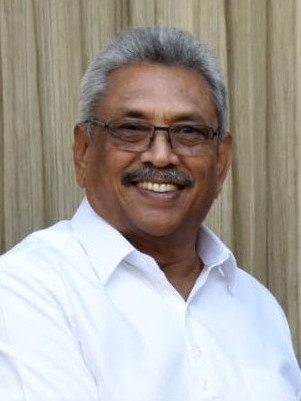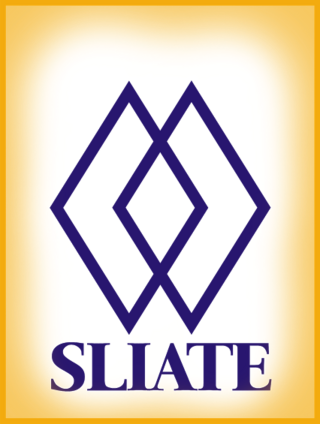
The Colombo Plan is a regional intergovernmental organization that began operations on 1 July 1951. The organization was conceived at an international conference, The Commonwealth Conference on Foreign Affairs held in Colombo, Ceylon in January 1950, and was attended by the finance ministers of Australia, the United Kingdom, Canada, Ceylon, Pakistan and New Zealand, and the prime ministers of Ceylon and India. Membership has expanded significantly over the years to the current 28 governments.

The University of Colombo is a public research university located primarily in Colombo, Sri Lanka. It is the oldest institution of modern higher education in Sri Lanka. Specialised in the fields of Natural, Social, and Applied Sciences as well as Mathematics, Computer Sciences, Law, and Technology. It is ranked among the top 10 universities in South Asia.

Education in Sri Lanka has a long history that dates back two millennia. While the Constitution of Sri Lanka does not provide free education as a fundamental right, the constitution mentions that 'the complete eradication of illiteracy and the assurance to all persons of the right to universal and equal access to education at all levels" in its section on directive principles of state policy at (27. Sri Lanka's population had an adult literacy rate of 96.3% in 2015, which is above average by world and regional standards. Computer literacy in 2017 28.3% and phone users in 2017 105%, website users 32% in 2017. Education plays a major part in the life and culture of the country, which dates back to 543 BC. Sri Lanka's modern educational system modeled after Christian missionary system was brought about by its integration into the British Empire in the 19th century. Education currently falls under the control of both the Central Government and the Provincial Councils, with some responsibilities lying with the Central Government and the Provincial Council having autonomy for others.

The University of Peradeniya is a public university in Sri Lanka, funded by the University Grants Commission. It is the largest university in Sri Lanka, which was originally established as the University of Ceylon in 1942. The university was officially opened on 20 April 1954, in the presence of Queen Elizabeth II, by Prince Philip, Duke of Edinburgh.

The Sri Lanka Army is the oldest and largest of the Sri Lanka Armed Forces. The army was officially established as the Ceylon Army in 1949, though the army traces its roots back in 1881 when Ceylon Light Infantry Volunteers was created; the army was renamed as the 'Sri Lanka Army' when Sri Lanka became a republic in 1972. In 2024, the Army had approximately 150,000 personnel.

The Sri Lanka Air Force is the air arm and the youngest of the Sri Lanka Armed Forces. It was founded in 1951 as the Royal Ceylon Air Force (RCyAF) with the assistance of the Royal Air Force (RAF). The SLAF played a major role throughout the Sri Lankan Civil War. The SLAF operates more than 160 aircraft.

Nandasena Gotabaya Rajapaksa, is a former Sri Lankan politician and military officer, who served as the eighth president of Sri Lanka from 18 November 2019 until his resignation on 14 July 2022. He previously served as Secretary to the Ministry of Defence and Urban Development from 2005 to 2015 under the administration of his elder brother former President Mahinda Rajapaksa, during the final phase of the Sri Lankan Civil War.
Admiral Deshamanya D. Basil Gunasekara was the Commander of the Sri Lanka Navy from 1973 to 1979.

The University of Jaffna is a public university in Jaffna, Sri Lanka. Established in 1974 as the sixth campus of the University of Sri Lanka, it became an independent, autonomous university in 1979.

Ajith Perera is a Sri Lankan politician and member of Parliament, who commenced his political career as a member of the Provincial Council of the Western Provincial Council in 2009. A lawyer by profession, he was first elected to the Parliament of Sri Lanka in 2010 as a member of the United National Party from the Kalutara District. He was re-elected to the Parliament in 2015.

Maradana College of Technology is the oldest technical college in Sri Lanka. Formally known as the Ceylon Technical College which was an institution of higher education for Technical and Scientific fields in Ceylon and a government department. It was established as the Government Technical College in 1893 at Maradana, Colombo. In 1906 with renamed as Ceylon Technical College, it was the center for study of science such as chemistry, physics, biology and all technical training and development special in the areas of civil, electrical and mechanical engineering. The Maradana Technical College Building has become a landmark of Colombo.

Royal College, Colombo also known as; Royal Colombo, Colombo Royal College or Colombo Royal) is a boys' school located in Cinnamon Gardens, Colombo, Sri Lanka. Started by Joseph Marsh in 1835, it was established as the Colombo Academy by Sir Robert Wilmot-Horton in January 1836, as part of the implementation of the recommendations of the Colebrooke Cameron Commission (1833), and was the first government-run secondary school for boys in the country.

The Sri Lanka Institute of Advanced Technological Education is a statutory body in Sri Lanka coming under the purview of the Higher Education Ministry and offering Higher National Diploma courses. At present, it manages and supervises eighteen provincial Advanced Technological Institutes throughout the island. The institute is traditionally known for its education in the accountancy and engineering. As per the recommendations of the Committee appointed by Prof. Wiswa Waranapala, Deputy Minister of Higher Education in 1994, the Sri Lanka Institute of Advanced Technical Education (SLIATE) was formed in 1995, under the Sri Lanka Institute of Advanced Technical Education Act No. 29 of 1995. In 2001, the name of the institution was amended as Sri Lanka Institute of Advanced Technological Education (SLIATE).
Dona Enfreeda Rangani Chitra Weddikkara (1947), known as Chitra Weddikkara, is a Sri Lankan professor of building economics, a chartered architect, a chartered quantity surveyor, an external examiner, an administrator, and a frequent speaker at construction-related professional venues.
General Lionel Piyananda Balagalle,, was a senior Sri Lanka Army officer, who served as the Commander of the Sri Lanka Army and the Chief of the Defence Staff. He is known for formalising military intelligence operations within the Sri Lanka Army, having founded the Directorate of Military Intelligence and the Military Intelligence Corps.
The UNESCO-UNEVOC International Centre for Technical and Vocational Education and Training is the International Centre for connecting UNESCO Member States worldwide to develop and strengthen technical and vocational education and training (TVET). The International Centre is located at the United Nations Campus in Bonn, Germany and is financed by both UNESCO and the German government. UNESCO-UNEVOC works in the context of UNESCO’s mandate "to lead and coordinate Education 2030 through guidance and technical support". It undertakes its activities through a global network of TVET institutions comprising departments of ministries, national TVET bodies, Universities, and nationally leading training centers.
B. J. C. Perera is a Sri Lankan pediatrician. He is the Editor-in-Chief of Sri Lanka Journal of Bio-Medical Informatics.

The Lanka Education and Research Network (LEARN), formerly the Lanka Experimental Academic and Research Network, is a specialized internet service provider dedicated to supporting the needs of the research and education communities within Sri Lanka. The history of the internet in Sri Lanka began with the initial proposal of the 'Lankan Experimental Academic and Research Network' (LEARN) to Sri Lankan government in 1989 by Prof. Abhaya Induruwa. In 1990 the LEARNmail was initiated and the first message was sent over LEARN was from the University of Moratuwa to the University of Colombo. In 1994, wireless links were used to create first Internet Protocol / Wide area network (IP/WAN) in Sri Lanka between University of Colombo, University of Moratuwa and Open University of Sri Lanka. Based on a proposal submitted in 1992 to Sri Lankan government, LEARN connected to the internet in 1995 opening doors to the Internet era in Sri Lanka
The International Federation of Workers' Education Associations (IFWEA) is an international organisation of associations, foundations, non-governmental organisations and trade unions involved in adult education for working people. It is based in Cape Town, South Africa, is an observer at the International Labour Organisation and UNESCO and is a member of SOLIDAR.
The Sri Lankan Armed Forces have established numerous academies and staff colleges across Sri Lanka for the purpose of training professional soldiers in military sciences, warfare command and strategy, and associated technologies.














